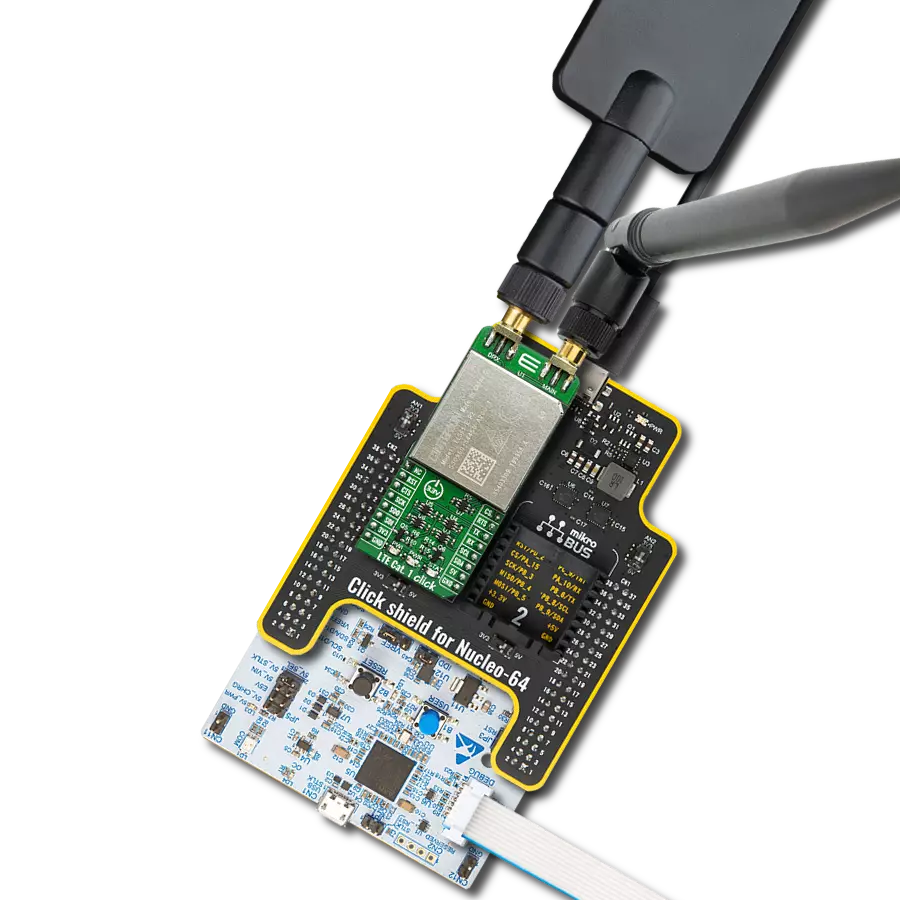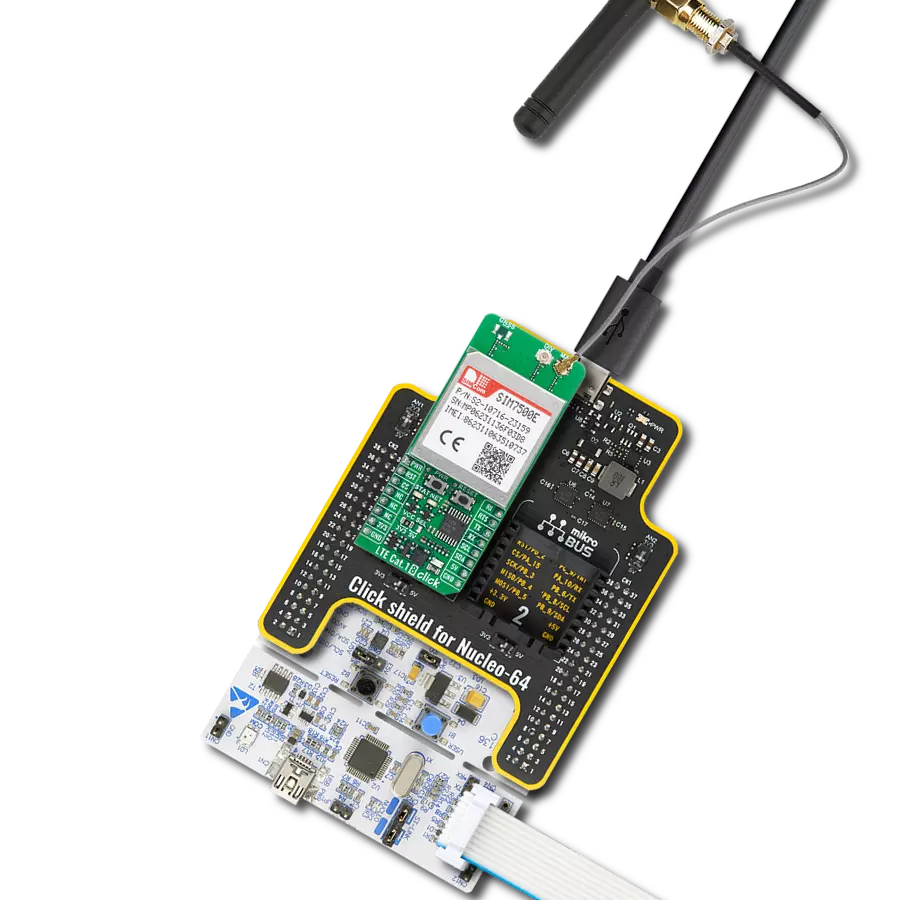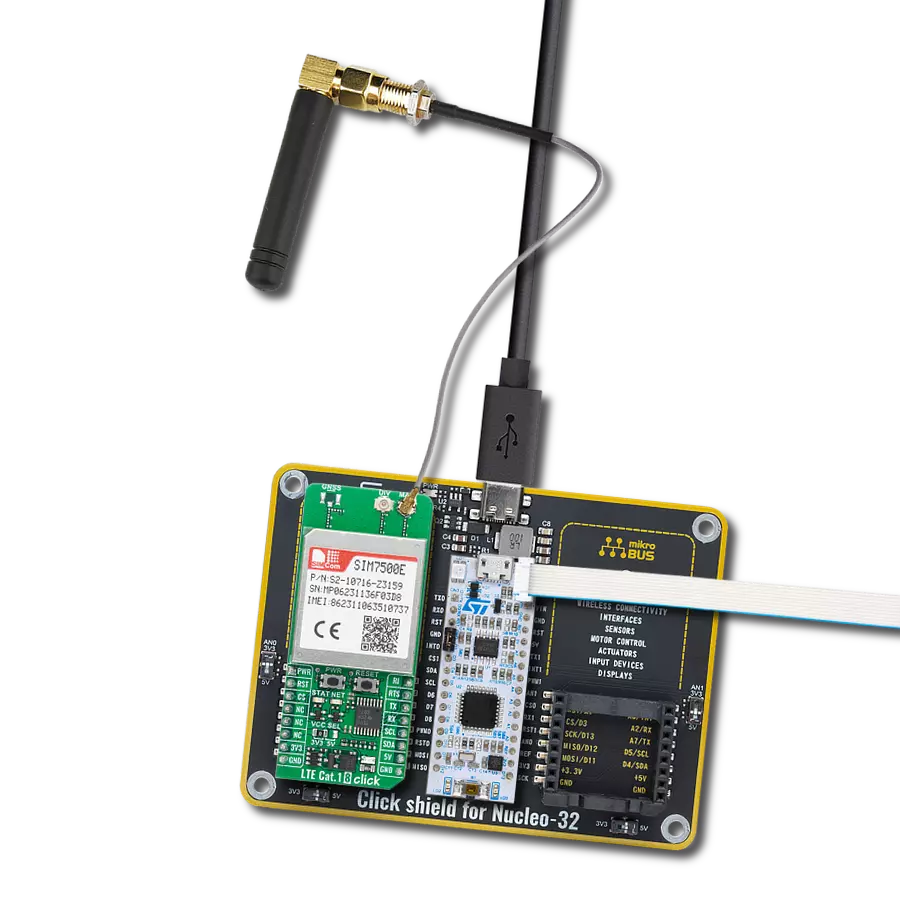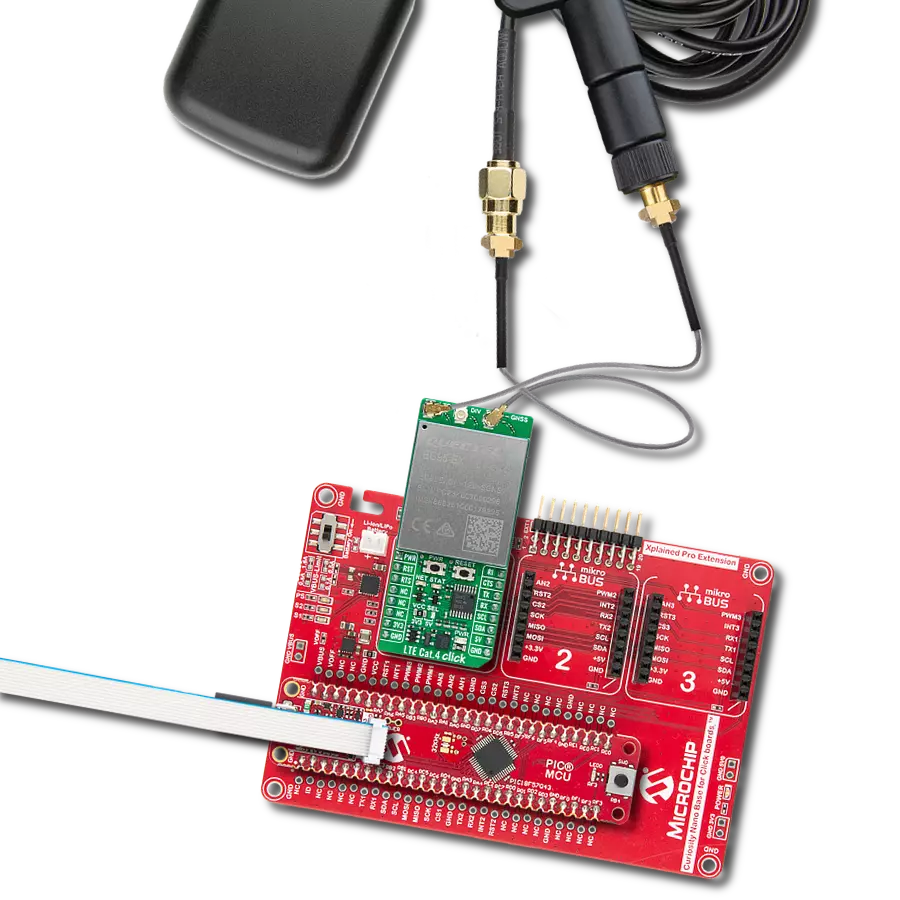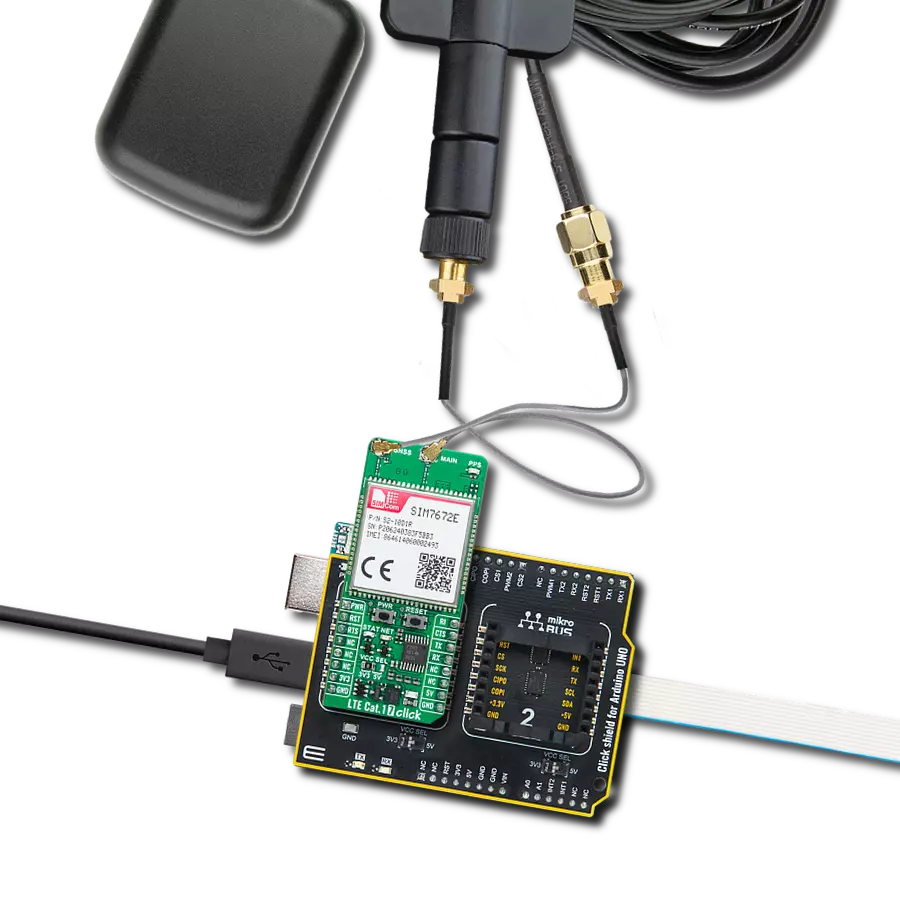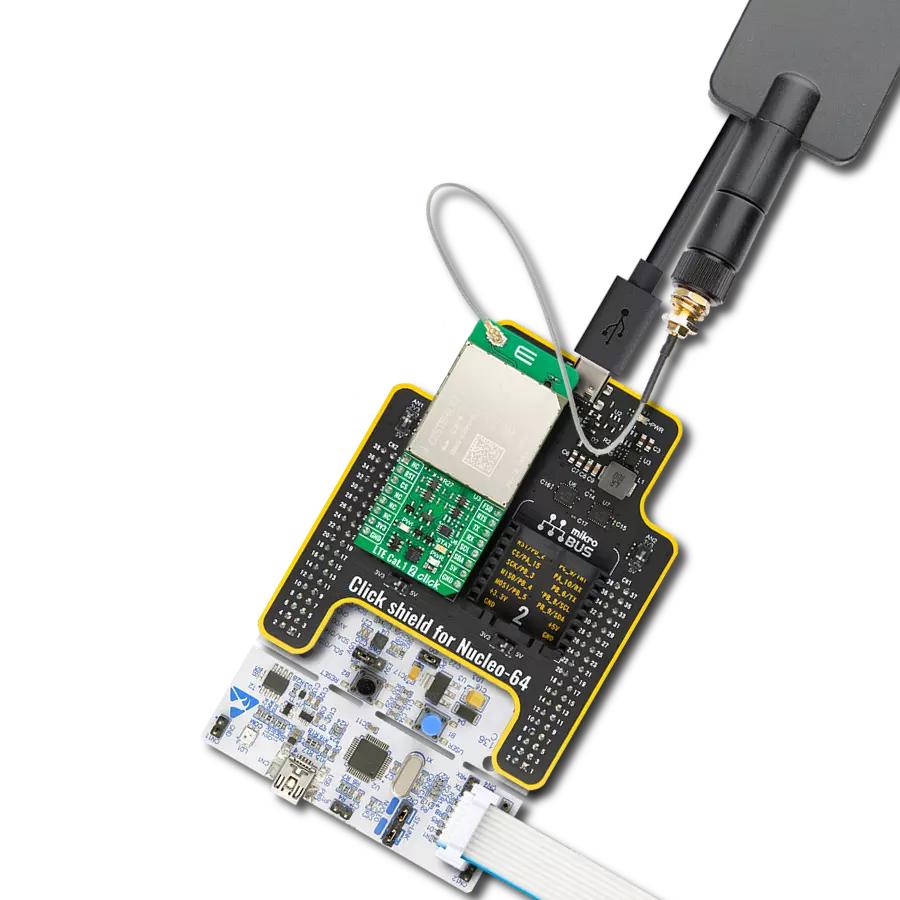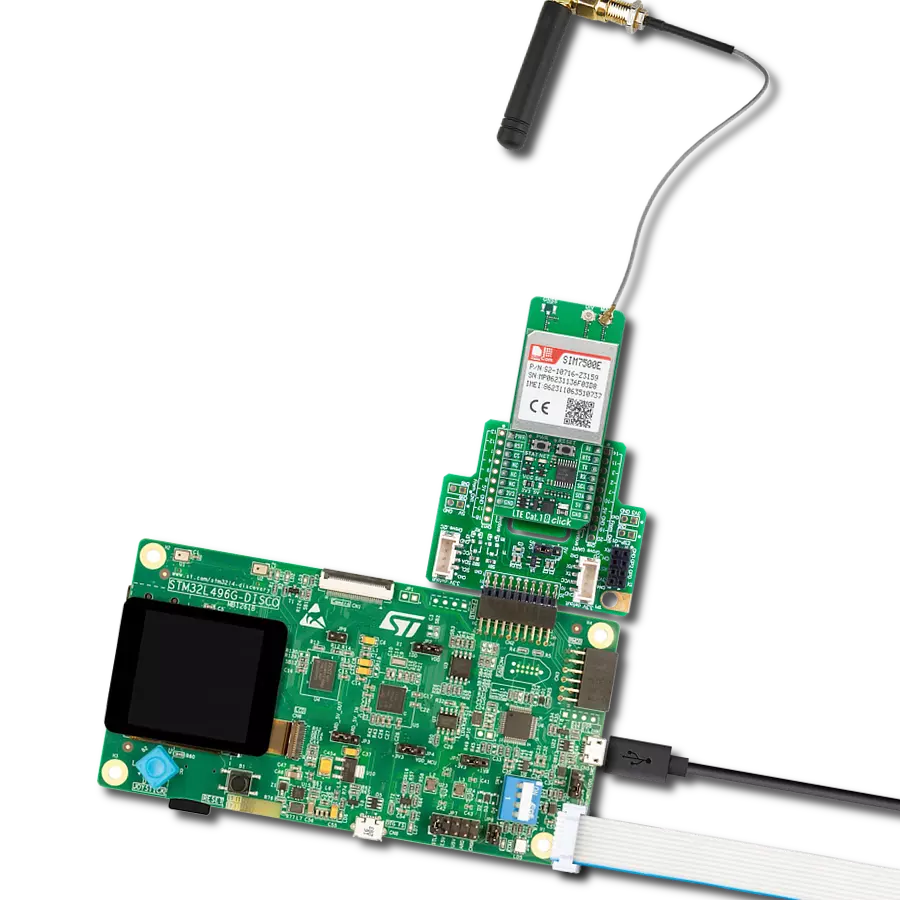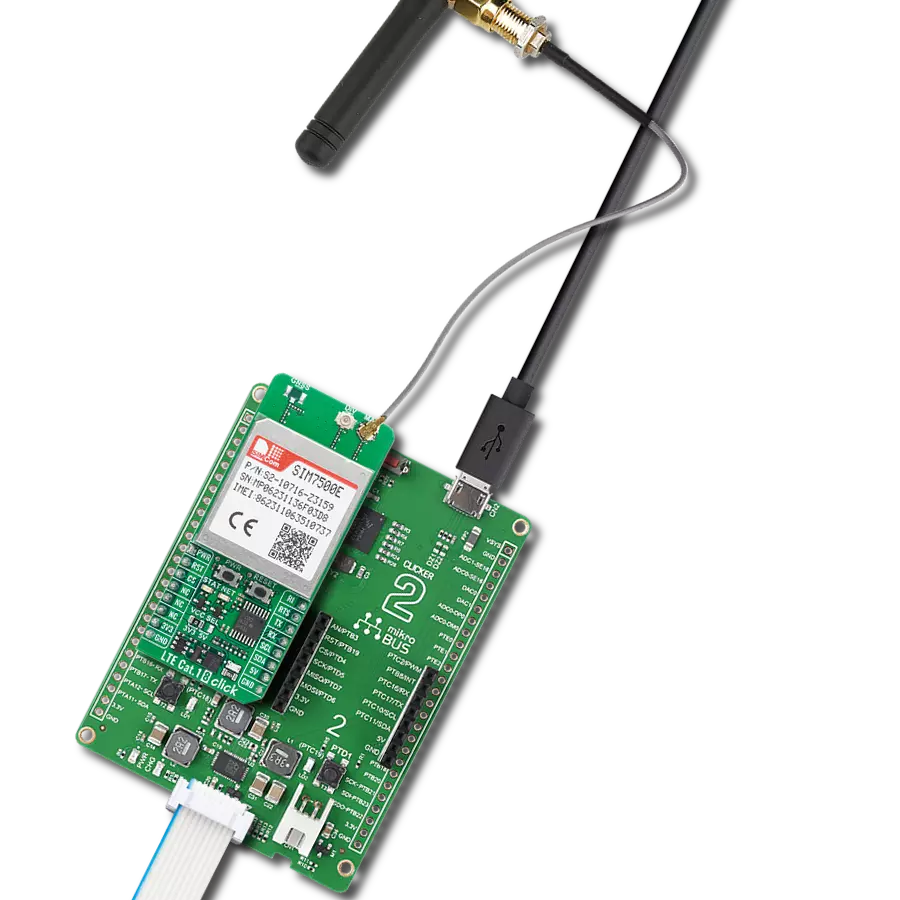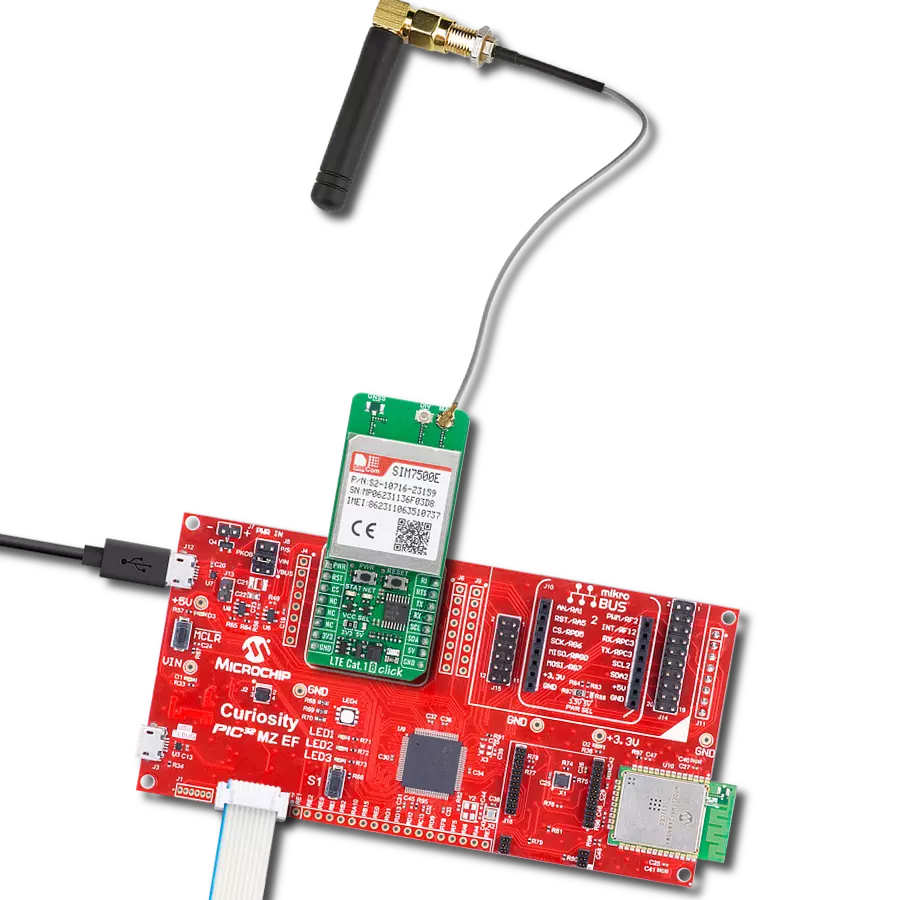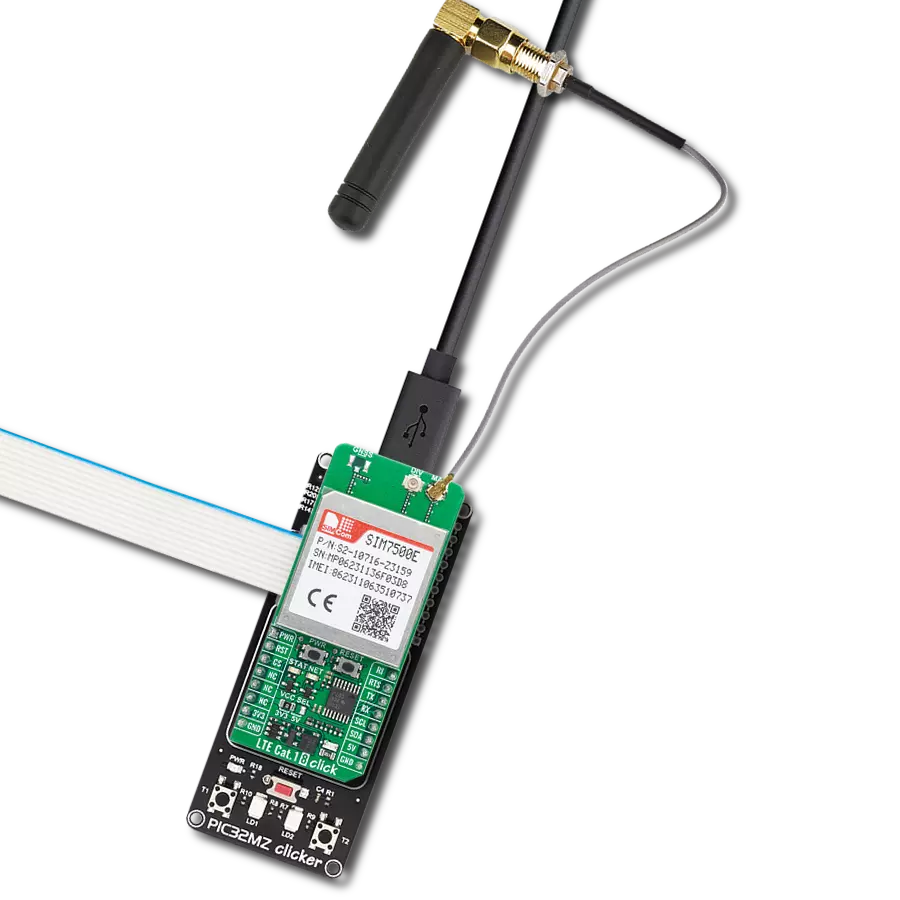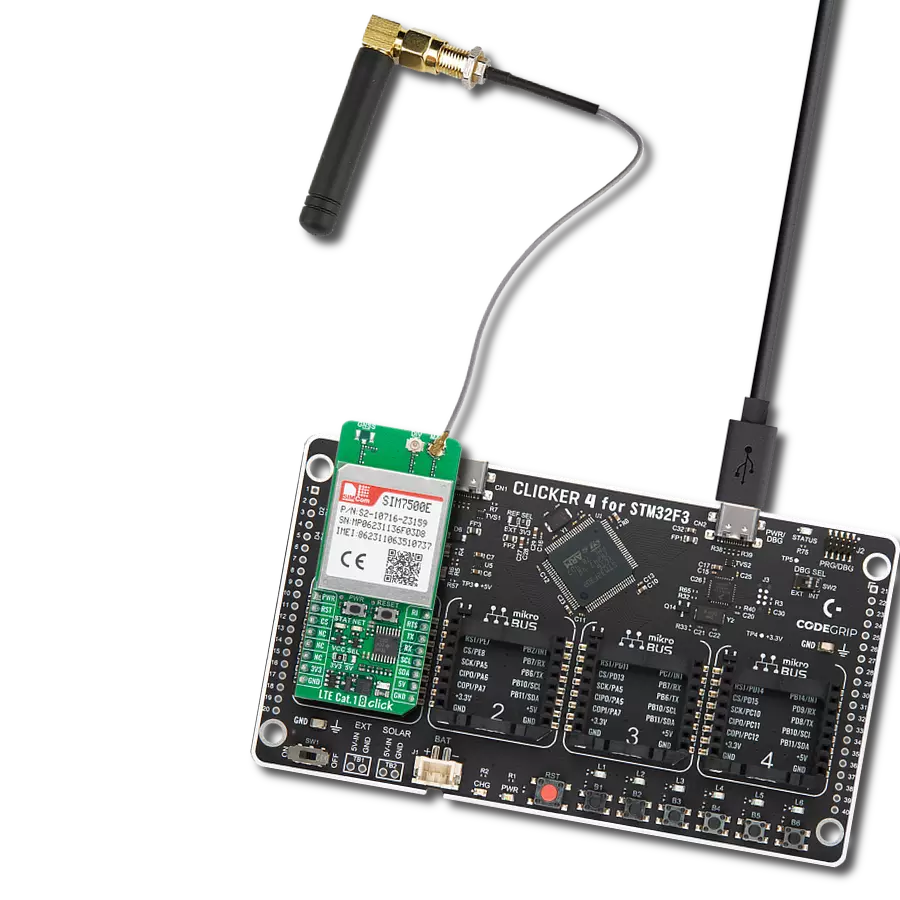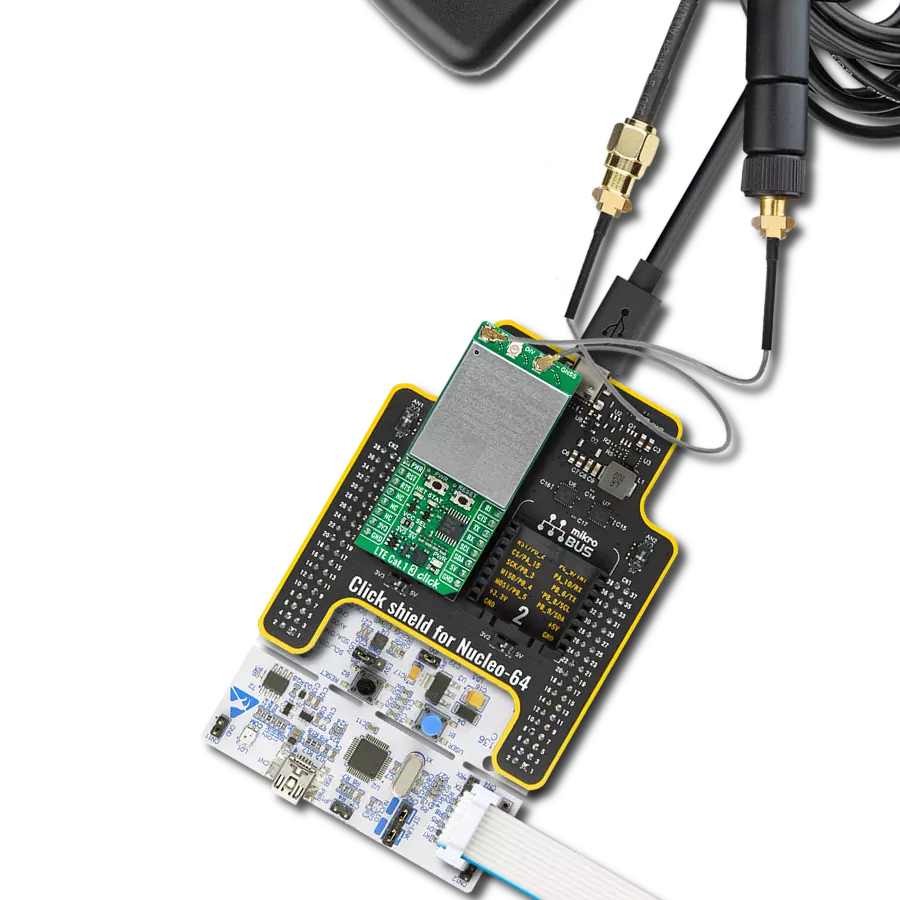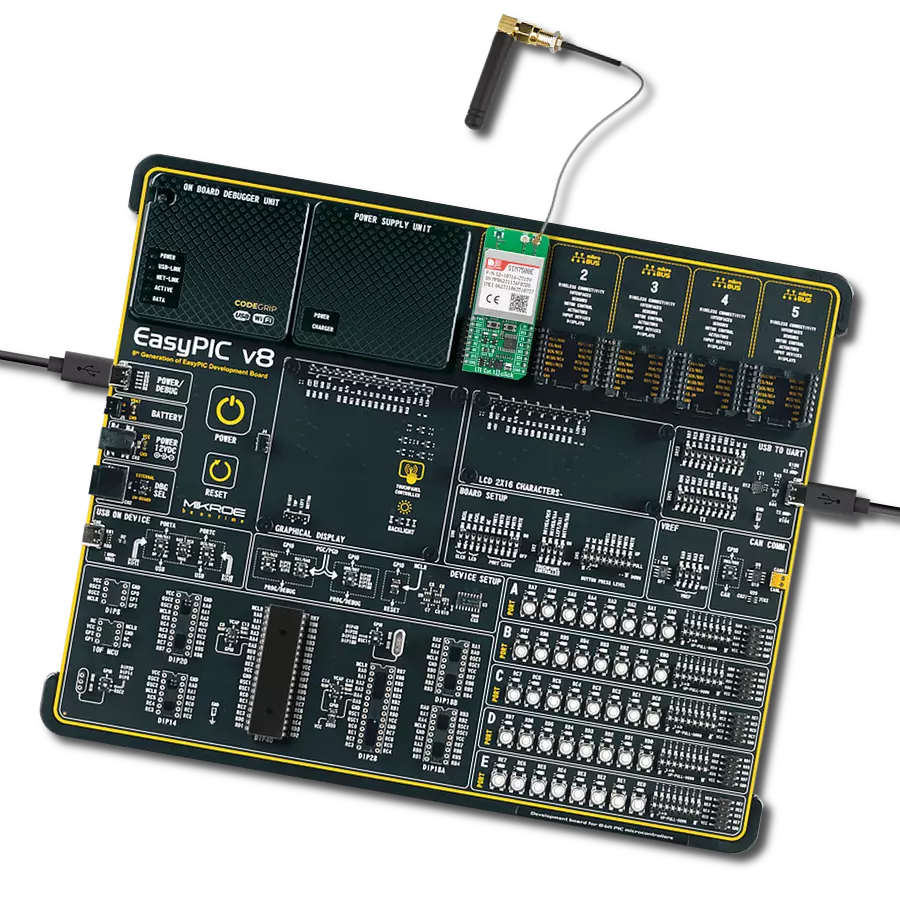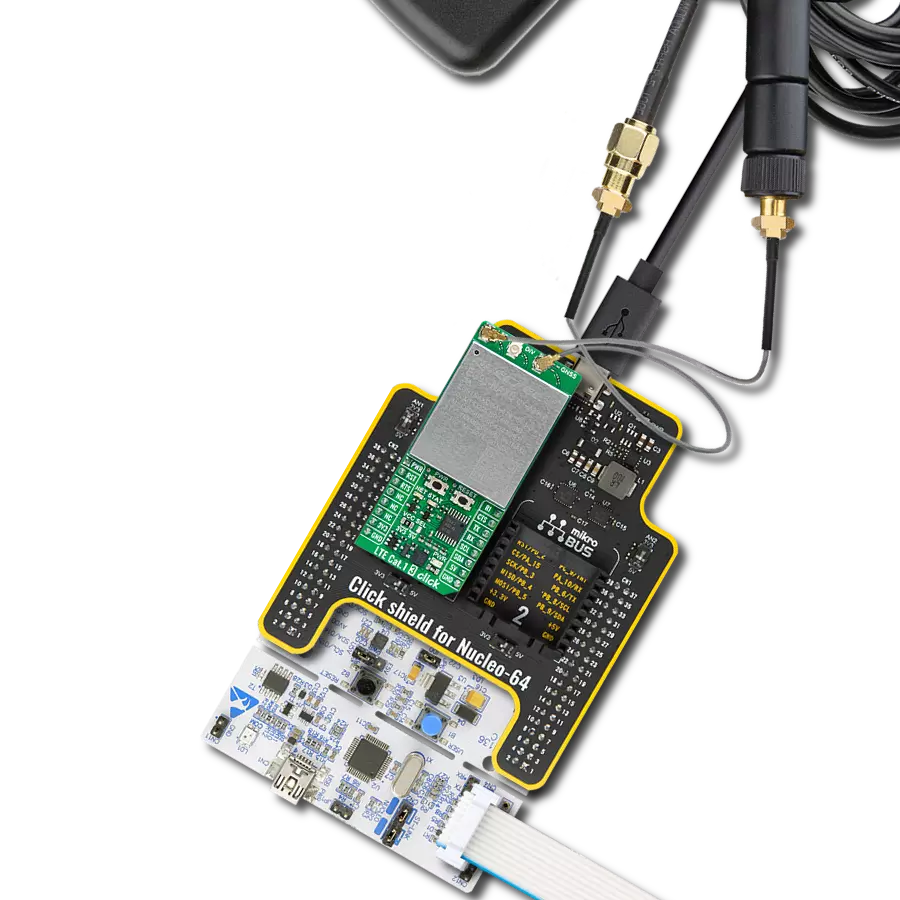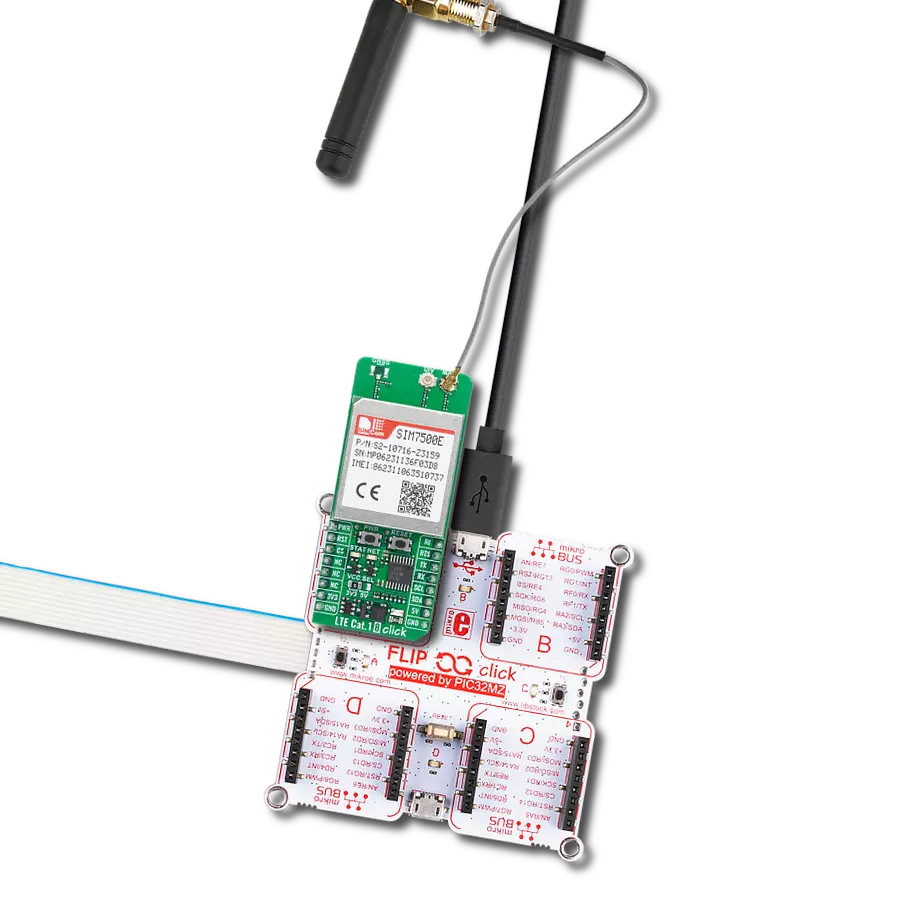通过拥抱GSM网络的优势,我们赋予您自信和可靠的沟通能力,塑造了一个充满无限可能性的未来。
A
A
硬件概览
它是如何工作的?
GSM3 Click 基于 SIMCom 的 SIM800H,这是一款 GSM/GPRS 模块,符合 GSM 第 2/2+ 阶段标准,具备完整的蜂窝网络通信选项。它具有网络状态指示、干扰检测以及包括 TCP/IP、UDP、FTP、PPP、HTTP、电子邮件、MMS 等在内的嵌入式互联网协议。此外,它还具备先进的语音/音频功能,包括 FM 收音机接口。GPRS 多时隙等级 12 实现允许四个上行和四个下行时隙,开放五个时隙。数据通信速度在上行和下行连接中均为 85.6 kbps。此模块的一个突出特点是支持蓝牙 3.0+ EDR 协议。SIM800H 覆盖的频率为 850/900 MHz(2W 的 TX 功率)和 1800/1900 MHz(1W 的 TX 功率)。模块由几个内部模块组成,如天线切换部分、RF 收发部分(BT、FM 和 GSM)、内存、电源管理、模拟部分(音频、ADC)以及最重要的 - 蜂窝基带处理器。其接口由几条报告设备和网络状态的线路、SIM 卡接口线路、UART 接口线路和设备控制线路组成,这些线路被路由到 Click board™ 的相应元件。SIM800H 通过板载 LDO 以大约 4V 的电压供电,通过 5V 的 mikroBUS™ 电源轨,不论选择的 DATA LEVEL 如何。SIM800H 的数字部分内部供电为 2.8V,因此需要对连接宿主 MCU 的通信总线线路进行条件处理。为此,GSM3 配备了来自 Texas Instruments 的
TXB0106,这是一个 6 位双向电平转换和电压转换 器,具有自动方向感应功能。与宿主 MCU 的通信,GSM3 Click 使用 UART 接口,支持从 1200bps 到 115.2kbps 的标准波特率,支持最高 57.6kbps 的自动波特率检测,并默认设置。波特率设置存储在内部非易失性存储器中,因此一旦存储,这些设置将在电源周期间保持不变。除 UART 接口外,GSM3 Click 还包括硬件流控制引脚 RTS 和 CTS。一个标记为 NET 的红色 LED 指示网络状态(网络搜索/未注册、已注册到网络、和通信建立)。一个标记为 STAT 的黄色 LED 用于指示设备状态。当它亮起时,设备处于运行状态。它还表示内部模块初始化完成,模块已准备好工作。除了 LED,此状态还通过 STA 引脚路由到宿主 MCU。PWRKEY 引脚路由到 mikroBUS™ 的 PWK 引脚,用于手动开启/关闭 Click board™。将此引脚拉低至低逻辑电平至少 1 秒将切换 SIM800H 模块的电源状态。为了正确地从网络断开并在非易失性存储器中存储工作参数,应使用 PWK(PWRKEY)引脚或通过发出 AT+CPOWD=1 命令安全地关闭模块。突然中断电源可能会导致当前参数设置丢失和网络断开不当。如果这些方法不起作用,RST 引脚在低逻辑状态下也可以重置模块。该 Click board™ 的突出特点之一是通过来自 Antenova 的 2.4GHz RUFA
SMD 天线支持蓝牙 3.0+ EDR 协议。对于 GSM/GPRS 通信,GSM3 Click board 配备了 SMA 连接器,而适当的天线可在 MIKROE 商店购买。Click board™ 背面的 Micro SIM 卡插槽用于安装微型 SIM 卡。没有有效的 SIM 卡,设备将无法使用,这使其能够连接到蜂窝网络。支持 1.8V 和 3V 两种 SIM 卡类型,通信速度快达 64kbps(GSM Phase 2+)。SIM800H 模块还提供了丰富的音频功能,包括半速率、全速率、增强型全速率、自适应多速率语音编解码器、优越的回声消除,并且可以通过 AT 命令进行配置。音频 DSP 部分集成在模块中,仅需要一些外部组件。耳机可以通过 Click board™ 侧面的连接垫片连接。该垫片还提供 FM 天线连接,可用于收听 FM 广播。可以使用带有集成 FM 天线的耳机。通过 AT 命令可以调整 FM 收音机接收器的功能。来电会中断 FM 接收器的信号,并将其重定向到耳机。该 Click board™ 可通过 DATA LEVEL 跳线选择 3.3V 或 5V 逻辑电压电平进行操作。这样,既支持 3.3V 又支持 5V 的 MCU 可以正确使用通信线路。此外,该 Click board™ 配备了包含易于使用的函数和示例代码的库,可供进一步开发时参考。
功能概述
开发板
Nucleo-64 搭载 STM32G431RB MCU 提供了一种经济高效且灵活的平台,供开发者探索新想法并原型设计他们的项目。该板利用 STM32 微控制器的多功能性,使用户能够为他们的项目选择最佳的性能与功耗平衡。它配备了 LQFP64 封装的 STM32 微控制器,并包含了如用户 LED(同时作为 ARDUINO® 信号)、用户和复位按钮,以及 32.768kHz 晶体振荡器用于精确的计时操作等基本组件。Nucleo-64 板设计考虑到扩展性和灵活性,它特有的 ARDUINO® Uno
V3 扩展连接器和 ST morpho 扩展引脚头,提供了对 STM32 I/O 的完全访问,以实现全面的项目整合。电源供应选项灵活,支持 ST-LINK USB VBUS 或外部电源,确保在各种开发环境中的适应性。该板还配备了一个具有 USB 重枚举功能的板载 ST-LINK 调试器/编程器,简化了编程和调试过程。此外,该板设计旨在简化高级开发,它的外部 SMPS 为 Vcore 逻辑供电提供高效支持,支持 USB 设备全速或 USB SNK/UFP 全速,并内置加密功能,提升了项目的功效
和安全性。通过外部 SMPS 实验的专用连接器、 用于 ST-LINK 的 USB 连接器以及 MIPI® 调试连接器,提供了更多的硬件接口和实验可能性。开发者将通过 STM32Cube MCU Package 提供的全面免费软件库和示例得到广泛支持。这些,加上与多种集成开发环境(IDE)的兼容性,包括 IAR Embedded Workbench®、MDK-ARM 和 STM32CubeIDE,确保了流畅且高效的开发体验,使用户能够充分利用 Nucleo-64 板在他们的项目中的能力。
微控制器概述
MCU卡片 / MCU
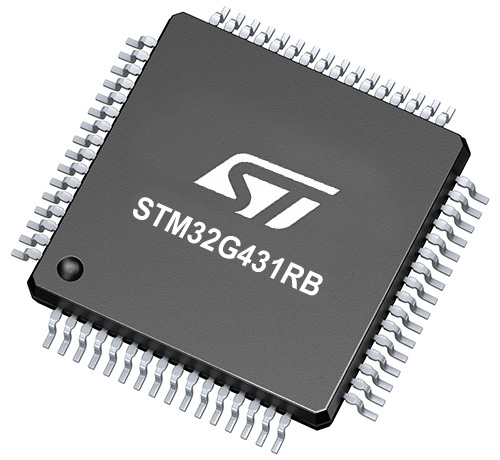
建筑
ARM Cortex-M4
MCU 内存 (KB)
128
硅供应商
STMicroelectronics
引脚数
64
RAM (字节)
32k
你完善了我!
配件
Click Shield for Nucleo-64 配备了两个专有的 mikroBUS™ 插座,使得所有的 Click board™ 设备都可以轻松地与 STM32 Nucleo-64 开发板连接。这样,Mikroe 允许其用户从不断增长的 Click boards™ 范围中添加任何功能,如 WiFi、GSM、GPS、蓝牙、ZigBee、环境传感器、LED、语音识别、电机控制、运动传感器等。您可以使用超过 1537 个 Click boards™,这些 Click boards™ 可以堆叠和集成。STM32 Nucleo-64 开发板基于 64 引脚封装的微控制器,采用 32 位 MCU,配备 ARM Cortex M4 处理器,运行速度为 84MHz,具有 512Kb Flash 和 96KB SRAM,分为两个区域,顶部区域代表 ST-Link/V2 调试器和编程器,而底部区域是一个实际的开发板。通过 USB 连接方便地控制和供电这些板子,以便直接对 Nucleo-64 开发板进行编程和高效调试,其中还需要额外的 USB 线连接到板子上的 USB 迷你接口。大多数 STM32 微控制器引脚都连接到了板子左右边缘的 IO 引脚上,然后连接到两个现有的 mikroBUS™ 插座上。该 Click Shield 还有几个开关,用于选择 mikroBUS™ 插座上模拟信号的逻辑电平和 mikroBUS™ 插座本身的逻辑电压电平。此外,用户还可以通过现有的双向电平转换器,使用任何 Click board™,无论 Click board™ 是否在 3.3V 或 5V 逻辑电压电平下运行。一旦将 STM32 Nucleo-64 开发板与我们的 Click Shield for Nucleo-64 连接,您就可以访问数百个工作于 3.3V 或 5V 逻辑电压电平的 Click boards™。
Rubber Antenna GSM/GPRS 直角型是我们广泛产品线中所有 GSM Click board™ 的理想伴侣。这款专业天线旨在优化您的无线连接,具有令人印象深刻的功能。它具有广泛的频率范围,涵盖 824-894/1710-1990MHz 或 890-960/1710-1890MHz,可处理各种频段,确保无缝可靠的连接。该天线拥有 50 欧姆的阻抗和 2dB 的增益,增强了信号接收和传输。其 70/180MHz 的带宽为各种应用提供了灵活性。垂直极化进一步提升了其性能。这款天线的最大输入功率容量为 50W,即使在苛刻的条件下也能确保强大的通信。尺寸紧凑,长度为 50mm,配有 SMA 母连接器,橡胶天线 GSM/GPRS 直角型是您无线通信需求的多功能紧凑解决方案。
使用的MCU引脚
mikroBUS™映射器
“仔细看看!”
Click board™ 原理图
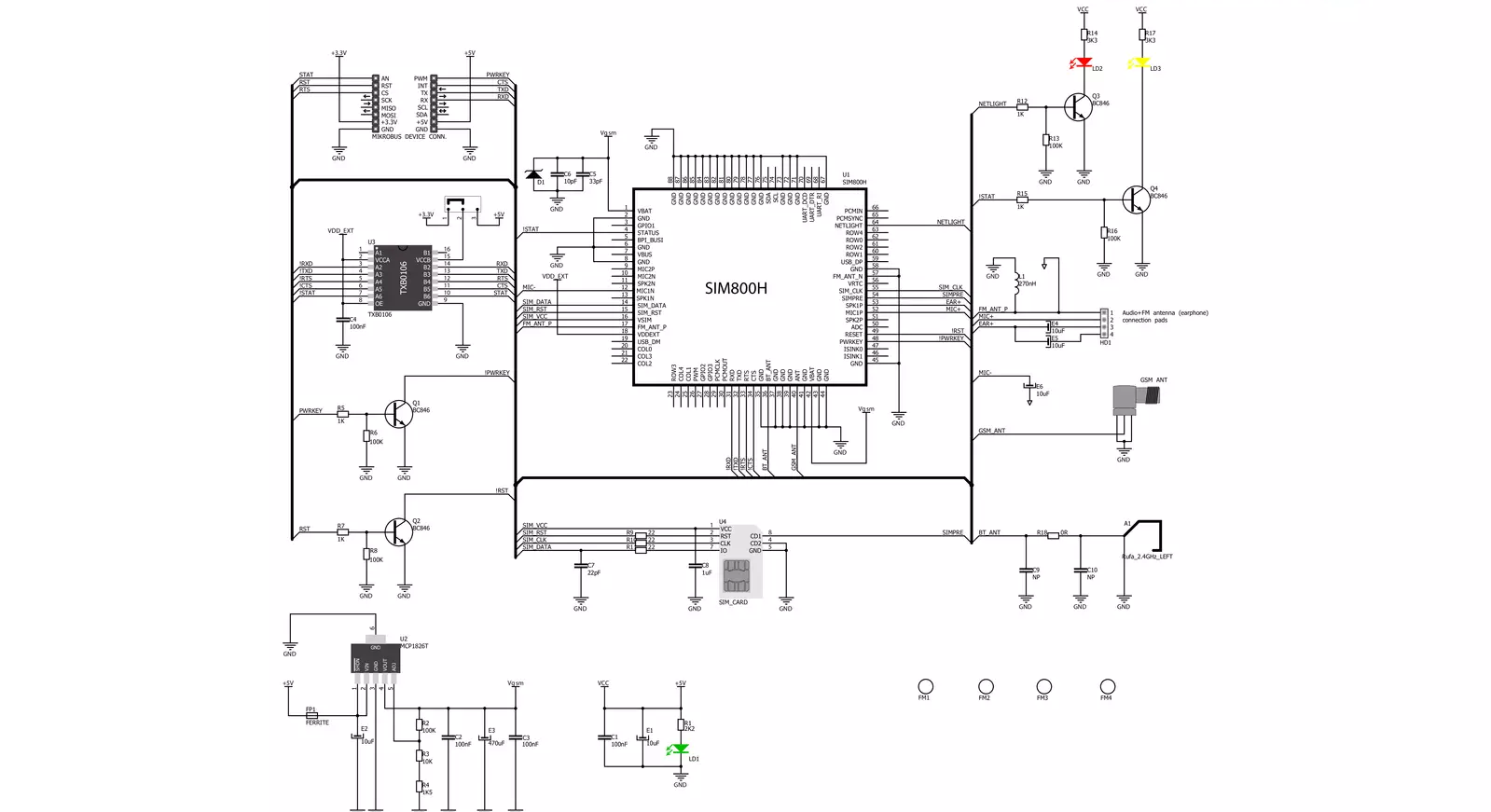
一步一步来
项目组装
实时跟踪您的结果
应用程序输出
1. 应用程序输出 - 在调试模式下,“应用程序输出”窗口支持实时数据监控,直接提供执行结果的可视化。请按照提供的教程正确配置环境,以确保数据正确显示。

2. UART 终端 - 使用UART Terminal通过USB to UART converter监视数据传输,实现Click board™与开发系统之间的直接通信。请根据项目需求配置波特率和其他串行设置,以确保正常运行。有关分步设置说明,请参考提供的教程。
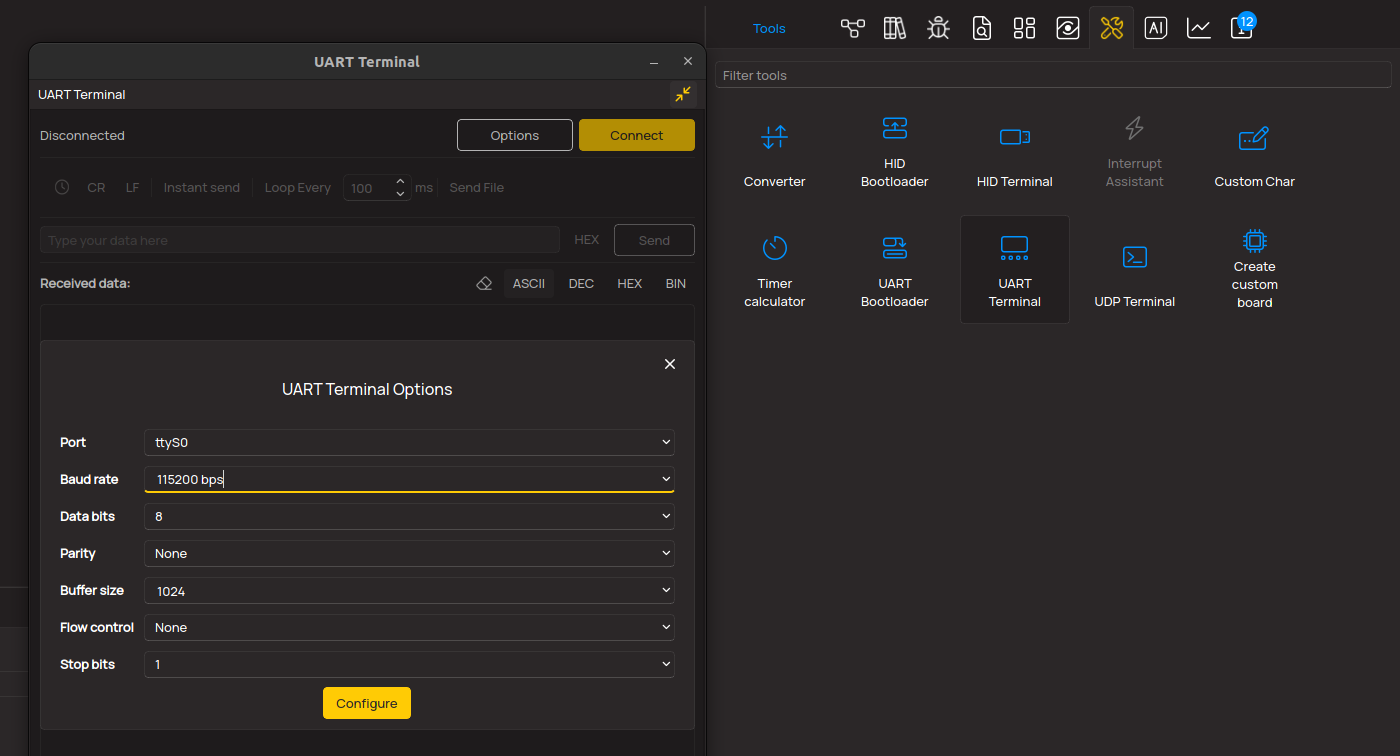
3. Plot 输出 - Plot功能提供了一种强大的方式来可视化实时传感器数据,使趋势分析、调试和多个数据点的对比变得更加直观。要正确设置,请按照提供的教程,其中包含使用Plot功能显示Click board™读数的分步示例。在代码中使用Plot功能时,请使用以下函数:plot(insert_graph_name, variable_name);。这是一个通用格式,用户需要将“insert_graph_name”替换为实际图表名称,并将“variable_name”替换为要显示的参数。
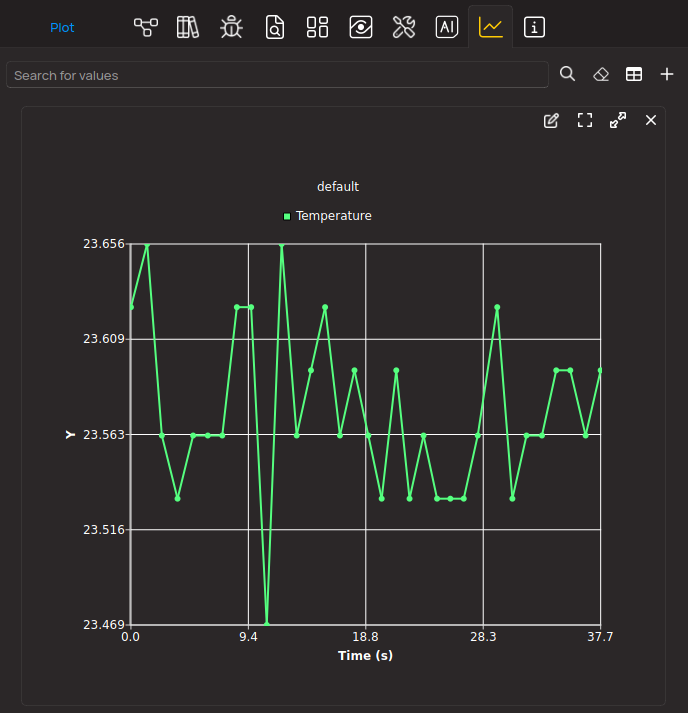
软件支持
库描述
这个库包含 GSM3 Click 驱动的 API。
关键函数:
gsm3_set_sim_apn- 设置 SIM 卡的 APN。gsm3_send_sms_text- 向手机号发送文本消息。gsm3_send_sms_pdu- 以 PDU 模式向手机号发送文本消息。
开源
代码示例
完整的应用程序代码和一个现成的项目可以通过NECTO Studio包管理器直接安装到NECTO Studio。 应用程序代码也可以在MIKROE的GitHub账户中找到。
/*!
* @file main.c
* @brief GSM 3 Click Example.
*
* # Description
* Application example shows device capability of connecting to the network and
* sending SMS or TCP/UDP messages using standard "AT" commands.
*
* The demo application is composed of two sections :
*
* ## Application Init
* Initializes the driver, tests the communication by sending "AT" command, and after that restarts the device.
*
* ## Application Task
* Application task is split in few stages:
* - GSM3_CONFIGURE_FOR_NETWORK:
* Sets configuration to device to be able to connect to the network.
*
* - GSM3_WAIT_FOR_CONNECTION:
* Waits for the network registration indicated via CREG URC event and then checks
* the connection status.
*
* - GSM3_CONFIGURE_FOR_EXAMPLE:
* Sets the device configuration for sending SMS or TCP/UDP messages depending on the selected demo example.
*
* - GSM3_EXAMPLE:
* Depending on the selected demo example, it sends an SMS message (in PDU or TXT mode) or TCP/UDP message.
*
* By default, the TCP/UDP example is selected.
*
* ## Additional Function
* - static void gsm3_clear_app_buf ( void )
* - static err_t gsm3_process ( void )
* - static void gsm3_error_check( err_t error_flag )
* - static void gsm3_log_app_buf ( void )
* - static err_t gsm3_rsp_check ( uint8_t *rsp )
* - static err_t gsm3_configure_for_connection( void )
* - static err_t gsm3_check_connection( void )
* - static err_t gsm3_configure_for_messages( void )
* - static err_t gsm3_send_message( void )
*
* @note
* In order for the examples to work, user needs to set the APN and SMSC (SMS PDU mode only)
* of entered SIM card as well as the phone number (SMS mode only) to which he wants to send an SMS.
* Enter valid values for the following macros: SIM_APN, SIM_SMSC and PHONE_NUMBER_TO_MESSAGE.
* Example:
SIM_APN "internet"
SIM_SMSC "+381610401"
PHONE_NUMBER_TO_MESSAGE "+381659999999"
*
* @author Stefan Filipovic
*
*/
#include "board.h"
#include "log.h"
#include "gsm3.h"
#include "conversions.h"
// Example selection macros
#define EXAMPLE_TCP_UDP 0 // Example of sending messages to a TCP/UDP echo server
#define EXAMPLE_SMS 1 // Example of sending SMS to a phone number
#define DEMO_EXAMPLE EXAMPLE_TCP_UDP // Example selection macro
// SIM APN config
#define SIM_APN "internet" // Set valid SIM APN
// SMS example parameters
#define SIM_SMSC "" // Set valid SMS Service Center Address - only in SMS PDU mode
#define PHONE_NUMBER_TO_MESSAGE "" // Set Phone number to message
#define SMS_MODE "1" // SMS mode: "0" - PDU, "1" - TXT
// TCP/UDP example parameters
#define REMOTE_IP "77.46.162.162" // TCP/UDP echo server IP address
#define REMOTE_PORT "51111" // TCP/UDP echo server port
// Message content
#define MESSAGE_CONTENT "GSM 3 Click board - demo example."
// Application buffer size
#define APP_BUFFER_SIZE 256
#define PROCESS_BUFFER_SIZE 256
/**
* @brief Example states.
* @details Predefined enum values for application example state.
*/
typedef enum
{
GSM3_CONFIGURE_FOR_NETWORK = 1,
GSM3_WAIT_FOR_CONNECTION,
GSM3_CONFIGURE_FOR_EXAMPLE,
GSM3_EXAMPLE
} gsm3_example_state_t;
static gsm3_t gsm3;
static log_t logger;
/**
* @brief Application example variables.
* @details Variables used in application example.
*/
static uint8_t app_buf[ APP_BUFFER_SIZE ] = { 0 };
static int32_t app_buf_len = 0;
static err_t error_flag;
static gsm3_example_state_t example_state;
/**
* @brief Clearing application buffer.
* @details This function clears memory of application
* buffer and reset its length and counter.
*/
static void gsm3_clear_app_buf ( void );
/**
* @brief Data reading function.
* @details This function reads data from device and
* appends it to the application buffer.
* @return @li @c 0 - Some data is read.
* @li @c -1 - Nothing is read.
* See #err_t definition for detailed explanation.
*/
static err_t gsm3_process ( void );
/**
* @brief Check for errors.
* @details This function checks for different types of
* errors and logs them on UART or logs the response if no errors occured.
* @param[in] error_flag Error flag to check.
*/
static void gsm3_error_check ( err_t error_flag );
/**
* @brief Logs application buffer.
* @details This function logs data from application buffer.
*/
static void gsm3_log_app_buf ( void );
/**
* @brief Response check.
* @details This function checks for response and
* returns the status of response.
* @param[in] rsp Expected response.
* @return @li @c 0 - OK response.
* @li @c -2 - Timeout error.
* @li @c -3 - Command error.
* @li @c -4 - Unknown error.
* See #err_t definition for detailed explanation.
*/
static err_t gsm3_rsp_check ( uint8_t *rsp );
/**
* @brief Configure device for connection to the network.
* @details Sends commands to configure and enable
* connection to the specified network.
* @return @li @c 0 - OK response.
* @li @c -2 - Timeout error.
* @li @c -3 - Command error.
* @li @c -4 - Unknown error.
* See #err_t definition for detailed explanation.
*/
static err_t gsm3_configure_for_network ( void );
/**
* @brief Wait for connection signal.
* @details Wait for connection signal from CREG URC.
* @return @li @c 0 - OK response.
* @li @c -2 - Timeout error.
* @li @c -3 - Command error.
* @li @c -4 - Unknown error.
* See #err_t definition for detailed explanation.
*/
static err_t gsm3_check_connection ( void );
/**
* @brief Configure device for example.
* @details Configure device for the specified example.
* @return @li @c 0 - OK response.
* @li @c -2 - Timeout error.
* @li @c -3 - Command error.
* @li @c -4 - Unknown error.
* See #err_t definition for detailed explanation.
*/
static err_t gsm3_configure_for_example ( void );
/**
* @brief Execute example.
* @details This function executes SMS or TCP/UDP example depending on the DEMO_EXAMPLE macro.
* @return @li @c 0 - OK response.
* @li @c -2 - Timeout error.
* @li @c -3 - Command error.
* @li @c -4 - Unknown error.
* See #err_t definition for detailed explanation.
*/
static err_t gsm3_example ( void );
void application_init ( void )
{
log_cfg_t log_cfg; /**< Logger config object. */
gsm3_cfg_t gsm3_cfg; /**< Click config object. */
/**
* Logger initialization.
* Default baud rate: 115200
* Default log level: LOG_LEVEL_DEBUG
* @note If USB_UART_RX and USB_UART_TX
* are defined as HAL_PIN_NC, you will
* need to define them manually for log to work.
* See @b LOG_MAP_USB_UART macro definition for detailed explanation.
*/
LOG_MAP_USB_UART( log_cfg );
log_init( &logger, &log_cfg );
log_info( &logger, " Application Init " );
// Click initialization.
gsm3_cfg_setup( &gsm3_cfg );
GSM3_MAP_MIKROBUS( gsm3_cfg, MIKROBUS_1 );
if ( UART_ERROR == gsm3_init( &gsm3, &gsm3_cfg ) )
{
log_error( &logger, " Application Init Error. " );
log_info( &logger, " Please, run program again... " );
for ( ; ; );
}
gsm3_process( );
gsm3_clear_app_buf( );
// Check communication
gsm3_send_cmd( &gsm3, GSM3_CMD_AT );
error_flag = gsm3_rsp_check( GSM3_RSP_OK );
gsm3_error_check( error_flag );
// Restart device
#define RESTART_DEVICE "1,1"
gsm3_send_cmd_with_par( &gsm3, GSM3_CMD_CFUN, RESTART_DEVICE );
error_flag = gsm3_rsp_check( GSM3_RSP_OK );
gsm3_error_check( error_flag );
log_info( &logger, " Application Task " );
example_state = GSM3_CONFIGURE_FOR_NETWORK;
}
void application_task ( void )
{
switch ( example_state )
{
case GSM3_CONFIGURE_FOR_NETWORK:
{
if ( GSM3_OK == gsm3_configure_for_network( ) )
{
example_state = GSM3_WAIT_FOR_CONNECTION;
}
break;
}
case GSM3_WAIT_FOR_CONNECTION:
{
if ( GSM3_OK == gsm3_check_connection( ) )
{
example_state = GSM3_CONFIGURE_FOR_EXAMPLE;
}
break;
}
case GSM3_CONFIGURE_FOR_EXAMPLE:
{
if ( GSM3_OK == gsm3_configure_for_example( ) )
{
example_state = GSM3_EXAMPLE;
}
break;
}
case GSM3_EXAMPLE:
{
gsm3_example( );
break;
}
default:
{
log_error( &logger, " Example state." );
break;
}
}
}
int main ( void )
{
/* Do not remove this line or clock might not be set correctly. */
#ifdef PREINIT_SUPPORTED
preinit();
#endif
application_init( );
for ( ; ; )
{
application_task( );
}
return 0;
}
static void gsm3_clear_app_buf ( void )
{
memset( app_buf, 0, app_buf_len );
app_buf_len = 0;
}
static err_t gsm3_process ( void )
{
uint8_t rx_buf[ PROCESS_BUFFER_SIZE ] = { 0 };
int32_t rx_size = 0;
rx_size = gsm3_generic_read( &gsm3, rx_buf, PROCESS_BUFFER_SIZE );
if ( rx_size > 0 )
{
int32_t buf_cnt = app_buf_len;
if ( ( ( app_buf_len + rx_size ) > APP_BUFFER_SIZE ) && ( app_buf_len > 0 ) )
{
buf_cnt = APP_BUFFER_SIZE - ( ( app_buf_len + rx_size ) - APP_BUFFER_SIZE );
memmove ( app_buf, &app_buf[ APP_BUFFER_SIZE - buf_cnt ], buf_cnt );
}
for ( int32_t rx_cnt = 0; rx_cnt < rx_size; rx_cnt++ )
{
if ( rx_buf[ rx_cnt ] )
{
app_buf[ buf_cnt++ ] = rx_buf[ rx_cnt ];
if ( app_buf_len < APP_BUFFER_SIZE )
{
app_buf_len++;
}
}
}
return GSM3_OK;
}
return GSM3_ERROR;
}
static err_t gsm3_rsp_check ( uint8_t *rsp )
{
uint32_t timeout_cnt = 0;
uint32_t timeout = 120000;
gsm3_clear_app_buf( );
gsm3_process( );
while ( ( 0 == strstr( app_buf, rsp ) ) &&
( 0 == strstr( app_buf, GSM3_RSP_ERROR ) ) )
{
gsm3_process( );
if ( timeout_cnt++ > timeout )
{
gsm3_clear_app_buf( );
return GSM3_ERROR_TIMEOUT;
}
Delay_ms ( 1 );
}
Delay_ms ( 100 );
gsm3_process( );
if ( strstr( app_buf, rsp ) )
{
return GSM3_OK;
}
else if ( strstr( app_buf, GSM3_RSP_ERROR ) )
{
return GSM3_ERROR_CMD;
}
else
{
return GSM3_ERROR_UNKNOWN;
}
}
static void gsm3_error_check ( err_t error_flag )
{
switch ( error_flag )
{
case GSM3_OK:
{
gsm3_log_app_buf( );
break;
}
case GSM3_ERROR:
{
log_error( &logger, " Overflow!" );
break;
}
case GSM3_ERROR_TIMEOUT:
{
log_error( &logger, " Timeout!" );
break;
}
case GSM3_ERROR_CMD:
{
log_error( &logger, " CMD!" );
break;
}
case GSM3_ERROR_UNKNOWN:
default:
{
log_error( &logger, " Unknown!" );
break;
}
}
Delay_ms ( 500 );
}
static void gsm3_log_app_buf ( void )
{
for ( int32_t buf_cnt = 0; buf_cnt < app_buf_len; buf_cnt++ )
{
log_printf( &logger, "%c", app_buf[ buf_cnt ] );
}
}
static err_t gsm3_configure_for_network ( void )
{
err_t func_error = GSM3_OK;
#if ( ( DEMO_EXAMPLE == EXAMPLE_TCP_UDP ) || ( DEMO_EXAMPLE == EXAMPLE_SMS ) )
Delay_ms ( 1000 );
Delay_ms ( 1000 );
Delay_ms ( 1000 );
Delay_ms ( 1000 );
Delay_ms ( 1000 );
// Deregister from network
#define DEREGISTER_FROM_NETWORK "2"
gsm3_send_cmd_with_par( &gsm3, GSM3_CMD_COPS, DEREGISTER_FROM_NETWORK );
error_flag = gsm3_rsp_check( GSM3_RSP_OK );
func_error |= error_flag;
gsm3_error_check( error_flag );
// Set SIM APN
gsm3_set_sim_apn( &gsm3, SIM_APN );
error_flag = gsm3_rsp_check( GSM3_RSP_OK );
func_error |= error_flag;
gsm3_error_check( error_flag );
// Enable full functionality
#define FULL_FUNCTIONALITY "1"
gsm3_send_cmd_with_par( &gsm3, GSM3_CMD_CFUN, FULL_FUNCTIONALITY );
error_flag = gsm3_rsp_check( GSM3_RSP_OK );
func_error |= error_flag;
gsm3_error_check( error_flag );
// Enable network registartion
#define ENABLE_REG "2"
gsm3_send_cmd_with_par( &gsm3, GSM3_CMD_CREG, ENABLE_REG );
error_flag = gsm3_rsp_check( GSM3_RSP_OK );
func_error |= error_flag;
gsm3_error_check( error_flag );
// Automatic registration
#define AUTOMATIC_REGISTRATION "0"
gsm3_send_cmd_with_par( &gsm3, GSM3_CMD_COPS, AUTOMATIC_REGISTRATION );
error_flag = gsm3_rsp_check( GSM3_RSP_OK );
func_error |= error_flag;
gsm3_error_check( error_flag );
#endif
return func_error;
}
static err_t gsm3_check_connection ( void )
{
#if ( ( DEMO_EXAMPLE == EXAMPLE_TCP_UDP ) || ( DEMO_EXAMPLE == EXAMPLE_SMS ) )
#define CONNECTED "+CREG: 2,1"
gsm3_send_cmd_check ( &gsm3, GSM3_CMD_CREG );
error_flag = gsm3_rsp_check( GSM3_RSP_OK );
gsm3_error_check( error_flag );
if ( strstr( app_buf, CONNECTED ) )
{
Delay_ms ( 100 );
// Check signal quality
gsm3_send_cmd( &gsm3, GSM3_CMD_CSQ );
error_flag = gsm3_rsp_check( GSM3_RSP_OK );
gsm3_error_check( error_flag );
#define NO_SIGNAL "99,99"
if ( !strstr( app_buf, NO_SIGNAL ) )
{
Delay_ms ( 1000 );
return error_flag;
}
}
Delay_ms ( 1000 );
return GSM3_ERROR;
#endif
return GSM3_OK;
}
static err_t gsm3_configure_for_example ( void )
{
err_t func_error = GSM3_OK;
#if ( DEMO_EXAMPLE == EXAMPLE_TCP_UDP )
#define ENABLE_RESPONSE_HEADER "1"
gsm3_send_cmd_with_par( &gsm3, GSM3_CMD_CIPHEAD, ENABLE_RESPONSE_HEADER );
error_flag = gsm3_rsp_check( GSM3_RSP_OK );
func_error |= error_flag;
gsm3_error_check( error_flag );
#elif ( DEMO_EXAMPLE == EXAMPLE_SMS )
gsm3_send_cmd_with_par( &gsm3, GSM3_CMD_CMGF, SMS_MODE );
error_flag = gsm3_rsp_check( GSM3_RSP_OK );
func_error |= error_flag;
gsm3_error_check( error_flag );
#else
#error "No demo example selected"
#endif
return func_error;
}
static err_t gsm3_example ( void )
{
err_t func_error = GSM3_OK;
#if ( DEMO_EXAMPLE == EXAMPLE_TCP_UDP )
uint8_t cmd_buf[ 100 ] = { 0 };
// Open TCP socket.
#define RESPONSE_CONNECT "CONNECT OK"
#define TCP_SERVICE_TYPE "\"TCP\","
strcpy( cmd_buf, TCP_SERVICE_TYPE );
strcat( cmd_buf, "\"" );
strcat( cmd_buf, REMOTE_IP );
strcat( cmd_buf, "\"" );
strcat( cmd_buf, "," );
strcat( cmd_buf, REMOTE_PORT );
gsm3_send_cmd_with_par( &gsm3, GSM3_CMD_CIPSTART, cmd_buf );
error_flag = gsm3_rsp_check( RESPONSE_CONNECT );
func_error |= error_flag;
gsm3_error_check( error_flag );
// Get message length
uint8_t message_len_buf[ 10 ] = { 0 };
uint16_t message_len = strlen( MESSAGE_CONTENT );
uint16_to_str( message_len, message_len_buf );
l_trim( message_len_buf );
r_trim( message_len_buf );
// Write message to TCP socket
uint8_t ctrl_z = 0x1A;
strcpy( cmd_buf, message_len_buf );
gsm3_send_cmd_with_par( &gsm3, GSM3_CMD_CIPSEND, cmd_buf );
error_flag = gsm3_rsp_check( ">" );
func_error |= error_flag;
gsm3_error_check( error_flag );
gsm3_generic_write ( &gsm3, MESSAGE_CONTENT, message_len );
gsm3_generic_write ( &gsm3, &ctrl_z, 1 );
// Read response
#define RESPONSE_URC "+IPD"
error_flag = gsm3_rsp_check( RESPONSE_URC );
func_error |= error_flag;
gsm3_error_check( error_flag );
log_printf( &logger, "\r\n" );
// Close TCP socket
gsm3_send_cmd( &gsm3, GSM3_CMD_CIPCLOSE );
error_flag = gsm3_rsp_check( GSM3_RSP_OK );
func_error |= error_flag;
gsm3_error_check( error_flag );
// Open UDP socket.
#define UDP_SERVICE_TYPE "\"UDP\","
strcpy( cmd_buf, UDP_SERVICE_TYPE );
strcat( cmd_buf, "\"" );
strcat( cmd_buf, REMOTE_IP );
strcat( cmd_buf, "\"" );
strcat( cmd_buf, "," );
strcat( cmd_buf, REMOTE_PORT );
gsm3_send_cmd_with_par( &gsm3, GSM3_CMD_CIPSTART, cmd_buf );
error_flag = gsm3_rsp_check( RESPONSE_CONNECT );
func_error |= error_flag;
gsm3_error_check( error_flag );
// Write message to UDP socket
strcpy( cmd_buf, message_len_buf );
gsm3_send_cmd_with_par( &gsm3, GSM3_CMD_CIPSEND, cmd_buf );
error_flag = gsm3_rsp_check( ">" );
func_error |= error_flag;
gsm3_error_check( error_flag );
gsm3_generic_write ( &gsm3, MESSAGE_CONTENT, message_len );
gsm3_generic_write ( &gsm3, &ctrl_z, 1 );
// Read response
error_flag = gsm3_rsp_check( RESPONSE_URC );
func_error |= error_flag;
gsm3_error_check( error_flag );
log_printf( &logger, "\r\n" );
// Close UDP socket
gsm3_send_cmd( &gsm3, GSM3_CMD_CIPCLOSE );
error_flag = gsm3_rsp_check( GSM3_RSP_OK );
func_error |= error_flag;
gsm3_error_check( error_flag );
Delay_ms ( 1000 );
Delay_ms ( 1000 );
Delay_ms ( 1000 );
Delay_ms ( 1000 );
Delay_ms ( 1000 );
#elif ( DEMO_EXAMPLE == EXAMPLE_SMS )
// Check SMS mode
#define CMGF_PDU "+CMGF: 0"
#define CMGF_TXT "+CMGF: 1"
gsm3_send_cmd_check( &gsm3, GSM3_CMD_CMGF );
error_flag = gsm3_rsp_check( GSM3_RSP_OK );
func_error |= error_flag;
gsm3_error_check( error_flag );
if ( strstr( app_buf, CMGF_PDU ) )
{
// Send SMS in PDU mode
gsm3_send_sms_pdu( &gsm3, SIM_SMSC, PHONE_NUMBER_TO_MESSAGE, MESSAGE_CONTENT );
error_flag = gsm3_rsp_check( GSM3_RSP_OK );
func_error |= error_flag;
gsm3_error_check( error_flag );
}
else if ( strstr( app_buf, CMGF_TXT ) )
{
// Send SMS in TXT mode
gsm3_send_sms_text ( &gsm3, PHONE_NUMBER_TO_MESSAGE, MESSAGE_CONTENT );
error_flag = gsm3_rsp_check( GSM3_RSP_OK );
func_error |= error_flag;
gsm3_error_check( error_flag );
}
// 30 seconds delay
Delay_ms ( 1000 );
Delay_ms ( 1000 );
Delay_ms ( 1000 );
Delay_ms ( 1000 );
Delay_ms ( 1000 );
Delay_ms ( 1000 );
Delay_ms ( 1000 );
Delay_ms ( 1000 );
Delay_ms ( 1000 );
Delay_ms ( 1000 );
Delay_ms ( 1000 );
Delay_ms ( 1000 );
Delay_ms ( 1000 );
Delay_ms ( 1000 );
Delay_ms ( 1000 );
Delay_ms ( 1000 );
Delay_ms ( 1000 );
Delay_ms ( 1000 );
Delay_ms ( 1000 );
Delay_ms ( 1000 );
Delay_ms ( 1000 );
Delay_ms ( 1000 );
Delay_ms ( 1000 );
Delay_ms ( 1000 );
Delay_ms ( 1000 );
Delay_ms ( 1000 );
Delay_ms ( 1000 );
Delay_ms ( 1000 );
Delay_ms ( 1000 );
Delay_ms ( 1000 );
#else
#error "No demo example selected"
#endif
return func_error;
}
// ------------------------------------------------------------------------ END
额外支持
资源
类别:GSM/LTE




















